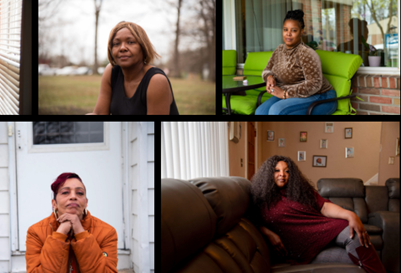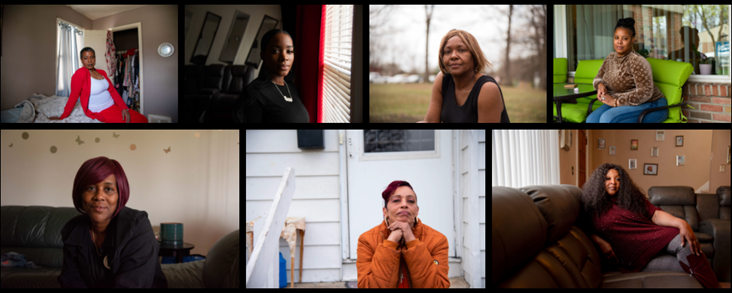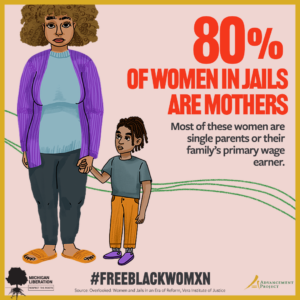The Best Mother’s Day Gift is Freedom
May 7, 2021

May 7, 2021
![]()
 Photo credit: Cyndi Elledge // Photos are a part of the #FreeBlackWomxn series. Visit www.freeblackwomxn.org.
Photo credit: Cyndi Elledge // Photos are a part of the #FreeBlackWomxn series. Visit www.freeblackwomxn.org.
Thousands of women with children across the United States will spend this Mother’s Day behind bars. The crisis of mass incarceration has fueled a family separation endemic: more than 150,000 children have a parent who is in jail simply because they are too poor to afford their court-imposed cash bail.
This year we are working to support the 2021 Black Mama’s Day Bailout organized and led by our community partners Michigan Liberation, a grassroots organization focused on transforming the criminal legal system across the state. Over the past three years, more than 50 people have been released from cages and allowed to return home to their families instead of being criminalized for their poverty because the of the bailout. This effort has illuminated the unique ways that families are impacted when their matriarchs are removed from the family unit because of incarceration.
The loss of a mother can destabilize a community. For young people without the emotional support they need to navigate family disruption, the absence of a mother can open the doors to the discriminatory foster care system and the school to prison pipeline. Far too often these circumstances manifest into generational cycles of incarceration.
There are also astronomical costs for keeping in touch with an incarcerated loved one. Predatory for-profit telecommunication systems charge $3 for a 15-minute phone call. For families struggling to make ends meet the cost of these calls can quickly add up. This includes mothers inside jails and prisons who earn pennies on the hour for their labor inside, if that. Some of their labor goes unpaid.
The loss of a mother can destabilize a community. For young people without the emotional support they need to navigate family disruption, the absence of a mother can open the doors to the discriminatory foster care system and the school to prison pipeline.
 The nexuses between criminalization, poverty, and systemic racism are inextricable. Women of color are disproportionately represented in jails across the country. Forty-four percent of them are Black, despite representing only 12% of the US population. In 2018, traffic offenses accounted for half of all criminal court cases in Michigan. Probation violations account for a significant portion of the population in jails around the state, which means that people are being accused of violating the countless terms of their community surveillance. Ripping people away from their families for these “crimes” is an abhorrent practice that has disruptive emotional, physical, and socioeconomic impacts, not just on the person who is detained, but on the people who care about them.
The nexuses between criminalization, poverty, and systemic racism are inextricable. Women of color are disproportionately represented in jails across the country. Forty-four percent of them are Black, despite representing only 12% of the US population. In 2018, traffic offenses accounted for half of all criminal court cases in Michigan. Probation violations account for a significant portion of the population in jails around the state, which means that people are being accused of violating the countless terms of their community surveillance. Ripping people away from their families for these “crimes” is an abhorrent practice that has disruptive emotional, physical, and socioeconomic impacts, not just on the person who is detained, but on the people who care about them.
We are celebrating the experiences of mothers impacted by mass incarceration with our #FreeBlackWomxn photo narrative project. (We use the term “womxn” to be inclusive of cis-gender women, trans, and gender non-conforming individuals.) These women have navigated tremendous obstacles with the determination to maintain bonds with their children and other loved ones despite being incarcerated. The goal of our project is to illuminate the experiences of women who have survived incarceration, and to demand action to dismantle the oppressive structures that allow this system to terrorize communities.
One of the most beautiful things about the women we had the honor of working with is their bravery. Kim and Machelle, two of the women featured in the #FreeBlackWomxn narrative project, were sentenced to terms of life in prison when they were teenagers. During the more than three decades that they spent in prison, they made the conscious decision to support other women, and since being released have focused their work on addressing the needs of others impacted by incarceration. Their courage and determination are inspiring. Read their stories by following Michigan Liberation’s Instagram: @miliberation.
The carceral system is designed to fracture families. More than 9,000 women across the country are pregnant when they are arrested and thrown in jail each year. Many women who are incarcerated while giving birth will be shackled to a bed when they deliver their child, and during the precious moments, hours, and days after birth. On average, women receive 24-48 hours with their newborn baby before they must relinquish custody.
What if instead of the $35,000 per individual that Michigan spends to incarcerate women each year, we used these resources to address the root causes of behaviors that are criminalized? Or if we better funded community-led, trauma and gender informed organizations that are designed to support people fighting mental health issues, addiction, and other socio-economic disparities? Roughly 25% of people in Michigan jails have some sort of mental illness. Jails and prisons can no longer be the catchall mechanism for all of the manifestations of the issues our society wants to turn away from.
Incarceration does not make us safer. We are safer when Black and Brown women are supported and nurtured in their efforts to care for their families. Our criminal punishment system is a failure. The Black Mama’s Day bailout is an opportunity for communities to come together in an effort to advocate for the freedom of women who want a better life for their families and themselves.
